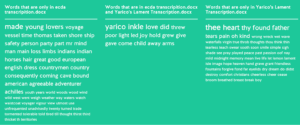Background Info
My research question is ‘“what aspects of ‘Yarico’s Lament’ make Inkle and Yarico’s relationship seem one-sided”’? I compared this document with the Steele version found on the ECDA called Story of Inkle and Yarico. In order to answer this question, I started by using SameDif to compare the keywords from each version. I noticed that the words “heart” and “thee” were only used in “Yarico’s Lament” so I used the word tree program to analyze them. Another observation I had was that “lovers” was only used in the Steele version. I used the word tree program for the Steele version and tried out different additional words that could provide insight on the reciprocity of their relationship, such as “he” and “love”.

Yarico’s Unrequited Love
In “Yarico’s Lament”, Yarico uses the words “thee” and “heart” most frequently. I chose to analyze these words on word tree because of the frequency and that neither word was used in the Steele version. Every instance of the word “thee” describes something that Yarico is doing for Inkle. For example, she “found thee”, “led thee”, “comfort thee”. The use of the word “thee” demonstrates that Yarico consistently provided for Inkle. The poem only vaguely describes what it is that Inkle did for her.
I also analyzed the word “heart”. In most cases, it is referring to Yarico’s heart. The first use of the word states “a heart still true to thee”. She still loves him even after his betrayal. But, this feeling is unsurprising because further on in the poem, she explains that she gave her “virgin heart away”. The word “virgin” is important because it means Inkle was her first love. She had never felt that way before about anyone. Therefore, when he betrays her, she says “My heart! Oh do not break so soon”. The only description of Inkle’s heart was that it was “mild”. Yarico says that she does not blame Inkle since he did not mean to hurt her. He had a mild heart. The word mild juxtaposes the deep emotions that Yarico was feeling. Collectively, this data supports the idea that Yarico’s love for Inkle was one-sided.
Different Versions, Different Love Stories
Contrastingly, the Stoy of Inkle and Yarico makes it seem like their love was requited. Heart and thee are not seen in the Steele version. Word counter showed that the word “lovers” was the second most commonly used word. “Lovers” implies that the pair is in love and that it is mutual. It groups them as one. “Yarico’s Lament” does not include words that imply the Inkle and Yarico are together. Instead, it uses words like “thee” and “I” which separate the two. The subtle word choices in these two pieces demonstrate the sharp contrast in the portrayal of Inkle and Yarico’s relationship.
Meta Data Tags
The metadata categories I used were “is Inkle forgiven”, “POV”, “genre”, “tone”. “Is Inkle Forgiven” was one tag idea we discussed in class. I thought this was a very useful tag because it shows Yarico’s attitude. In some of the versions (like this one) Yarico still loves Inkle and forgives him. But there are other versions where Yarico is spiteful and refuses to forgive him. This tag has a similar function to “tone”. In “Yarico’s Lament”, Yarico has a sad tone, but she is still loving towards Inkle. This differs from The Story of Inkle and Yarico which seems more factual than emotional. It doesn’t seem to tell a real “love story” but rather a recollection of Inkle’s adventures.
The tags “POV” and “genre” can be used to explain why The Story of Inkle and Yarico was more of a factual narrative. “Yarico’s Lament” is a poem that uses first-person from Yarico’s point of view. The use of the First-person makes the narrative seem more personal. The genre of poetry also tends to be more emotional and allows for more creative freedom. This contrasts with the Steele version which uses the third person to describe the plot of the story Inkle and Yarico.
Wrapping Things Up
This research has shown that point of view, word choice, and even genre can change the effects a story has on its reader. The two contrasting uses of “heart” in “Yarico’s Lament” show that the importance or meaning of a word can change depending on the context. When Yarico uses the word, it is loving and passionate. This juxtaposes with Inkle’s use which is indifferent or “mild”. In other versions of the story, Inkle is portrayed as loving towards Yarico because of words like “lovers” which demonstrates mutual feelings. Research techniques like this can be helpful for future studies because it shows what type of words change the attitude of the piece.